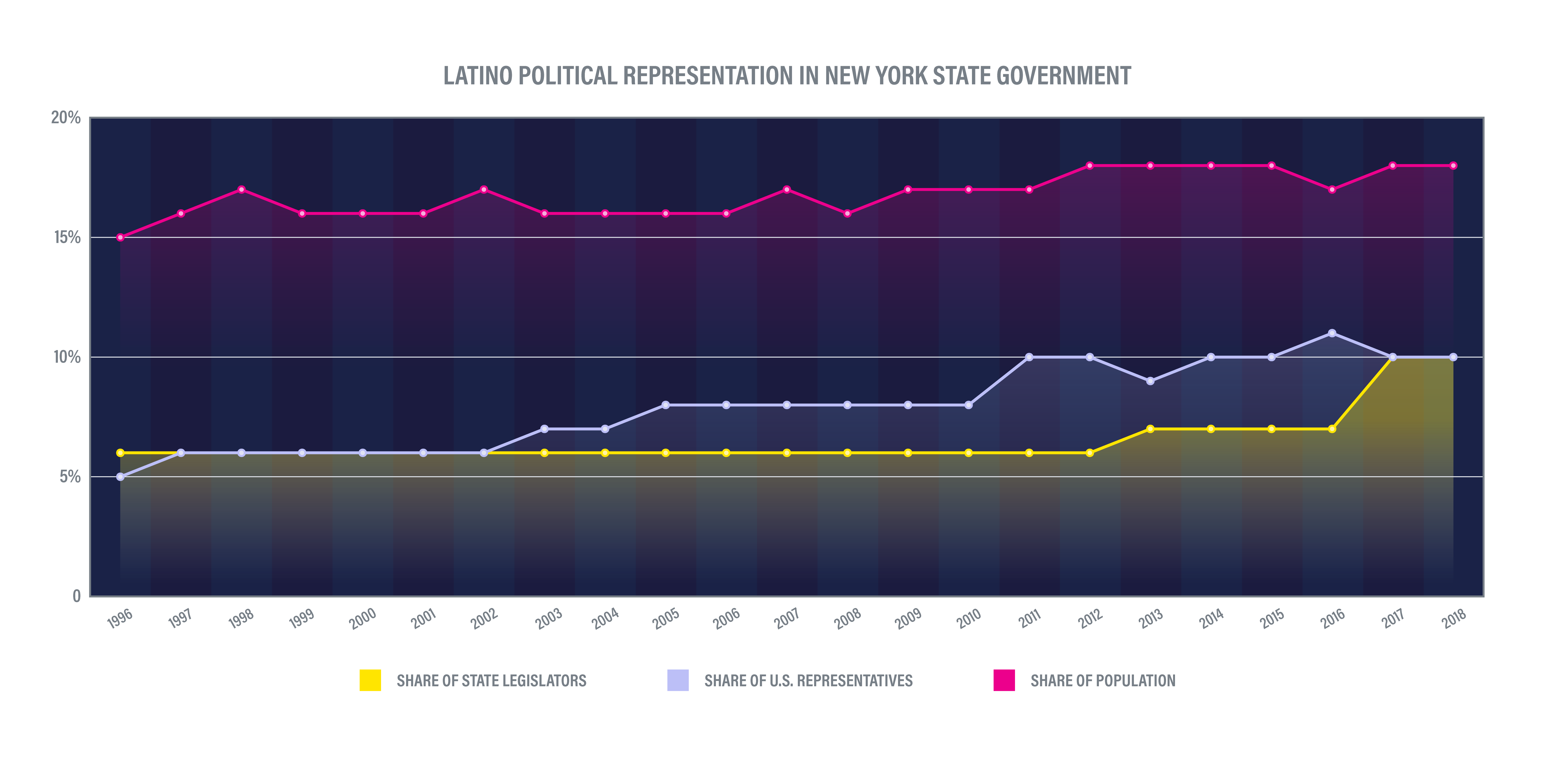New York State
The lag in Latino political representation
Recent years have seen only slight in improvement in the number of Latino elected officials.

photo courtesy Make the Road New York
Instead of a “blue wave” or a “red wave,” the lead-up to the U.S. midterm elections has been engulfed by a wave of intolerance, aimed at newcomers living in America. In the wake of an anti-Semitic mass shooting in Pittsburgh and pipe bombs mailed to critics of President Donald Trump, the president, boosted by allies, whipped up anti-immigrant fervor over a weary caravan of impoverished Central American migrants.
Given that there has also been an increase this year in deportation raids against immigrants and a policy of separating thousands of migrant children from their families, Latino New Yorkers may feel politically marginalized.
There is data that shows it’s true, at least in terms of political representation in the state. Latinos have seen frustratingly slow progress in winning legislative seats commensurate with their numbers.
New York has never had a governor, lieutenant governor, U.S. senator, attorney general or comptroller who is Latino. Likewise, New York City has never had a Latino mayor, comptroller or public advocate. “We still have a long way to go,” said Assemblyman Marcos Crespo, chairman of the Assembly’s Puerto Rican/Hispanic Task Force.
“Hispanics are underrepresented at basically every level of government,” said David Kallick, director of the Immigration Research Initiative at the Fiscal Policy Institute. While any immigrant or ethnic group gains a greater political presence as its population grows, Kallick said, Latinos and other communities of color face additional racial discrimination that has made it harder for them to gain full representation compared to previous newcomers, such as the Irish or Italians.
Nevertheless, Latinos are slowly closing the representation gap, based on an analysis of census data and data provided by the National Association of Latino Elected and Appointed Officials.
Hispanics make up 19.2 percent of New York state’s population, but currently only hold 10 percent of both state legislative seats and congressional seats, meaning there should be about twice as many Latino elected officials based on population. It’s a modest improvement from 1996, when less than 5 percent of state representatives, and 6 percent of its federal elected officials, were Latino – despite comprising more than 12 percent of the state population.

That narrowing but persistent representation gap has a powerful effect on where government focuses its attention and resources, advocates said. “The clear impact is that top policy priorities for Latino and immigrant communities continue to get short shrift at various levels of government,” said Daniel Altschuler, director of civic engagement and research at the immigrant rights’ group Make the Road New York. “Particularly, we’ve seen this in Albany.”
“Whether it be passing the DREAM Act; restoring access to driver’s licenses for all; ensuring fully funded public schools, particularly in high-need districts; investing in schools, not jails; or investing in adult literacy classes and English as a second language programs – we see this across the board every session in Albany when people lay out their state agendas,” Altschuler said. “Particularly in the state Senate, priorities like those are hard to find.”
Assembly leaders note that they have been increasingly successful in elevating such legislation, but concede that the Republican state Senate majority has often thwarted their passage.
While Latino neighborhoods in New York City often form majority-Latino districts that elect Latino representatives in the City Council, state Legislature and Congress, growing Latino communities in suburban areas often face entrenched legal obstacles to achieving greater political influence.
The South Shore of Long Island is a microcosm of the battle over underrepresentation on the local level. A lawsuit by Latino residents of Islip contends that the structure of the town’s government has “systematically prevented members of the town’s minority Latino community from electing any candidates of their choice to the Islip Town Board, thus denying the members of that community their most basic rights.” The town elects board members to represent the community as at large members instead of breaking the town into districts as, for example, the New York City Council does.
“No Latino residents, nor any other minority residents, have ever been elected to the Town Board,” the complaint notes, despite the fact that 1 in 3 residents are Latino. That lack of representation has lead to unequal treatment of predominantly Latino neighborhoods, the lawsuit alleges, including allowing the dumping of 40,000 tons of hazardous commercial waste in a public park; the neglect of potholes, broken streetlights and stop signs and less frequent garbage collection than the town’s more affluent, white neighborhoods. “No Latino has a chance, under the current system, of getting elected to the town board,” said Altschuler, whose organization, Make the Road New York, is a plaintiff in the lawsuit.
But Latino underrepresentation on Long Island is not confined to town boards. Despite Nassau and Suffolk counties being roughly evenly split between Republicans and Democrats, seven of the nine state senators from Long Island are Republican – and all of them are white, despite the fact that Latinos comprise 17.2 percent of Nassau’s population and 19.5 percent of Suffolk’s. That’s because the districts have been gerrymandered to maximize the GOP’s hold on those seats, which means keeping minorities from reaching a critical mass in any district. “We see a double whammy – at the local level and at the state level,” Altschuler said.
Gerrymandering at the state level has led to further disenfranchisement of Islip’s Latino community when the town’s majority-Latino neighborhood of Brentwood was split in two in 2012. “If you look, the line between state Senate Districts 3 and 4 literally draws a line right through Brentwood,” Altschuler said. “Brentwood was ground zero for gerrymandering of the state Senate map to effectively deprive those same majority-Latino constituents at the state level.”
Since the new lines were drawn, no Latino candidate has yet been able to win either district. But Democrat Monica Martinez of Brentwood is aiming to break that trend this election, vying for the 3rd District seat against Republican Assemblyman Dean Murray, who was chosen to run to replace outgoing Republican state Sen. Tom Croci.

Of course, measuring Latino empowerment solely in terms of legislative seats is overly narrow. Crespo pointed to the influence of other officials in elevating the concerns of the Latino community. “When you look at education in the last few years, between (New York City schools Chancellor) Richard Carranza and (state Board of Regents Chancellor) Betty Rosa, we’re now seeing Latinos at the top of the policymaking pyramid,” Crespo said. This puts them in a position to address the academic achievement gap among Latino students, in addition to serving all New Yorkers, Crespo said.
For the assemblyman, the true goal is not necessarily to have Latino electeds represented in government at mathematically proportionate levels, but something loftier and more egalitarian. “If someone were to ask me, ‘When do you feel Latinos have reached political empowerment?’ My answer is not going to be solely how many seats we won in general,” Crespo said. “It’s going to be the day that a Latino candidate doesn’t have to run based on the fact that they would be the first Latino to do X, Y or Z, or that their heritage is their primary pathway of support within the base, but rather that simply their goals or their vision for that particular seat merit support whether or not they happen to be Latino.”
In that vein, Crespo is keeping his eye on one race that could be a bellwether to show whether his hope could soon become reality. In Long Island’s 20th Assembly District, Juan Vides bested the Democratic county committee favorite for the party’s nomination and could prevail against incumbent freshman Republican Assemblywoman Melissa Miller. “Juan is proving that a strong candidate who happens to be Latino can make a case for himself and compete against politically established networks, send a strong message, be successful, and get support from a broader constituency,” Crespo said. “It’s a sign of the maturation of the community in a way that people are getting past the novelty factor of Latino candidates and just looking at the quality of those candidates.”

NEXT STORY: Updated: A guide to Cuomo’s 2018 challengers
